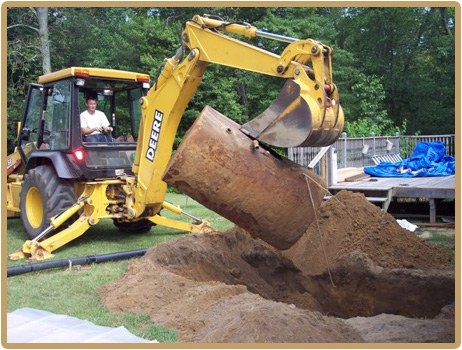The purpose of this document is to provide a concise reference to the preferred practices and procedures for oil tank removals in NJ.

Buried oil tanks raise a variety of environmental, safety, legal and economic concerns for home owners and home buyers. The largest concern relates to the environmental issues that are caused when the oil tank leaks and causes soil or groundwater contamination.
The following is a breakdown of the proper steps that should taken in order to remove your residential oil tank. Step 1: Permitting Local construction/demolition and/or fire subcode permits need to be applied for and the permits approved by the municipal office. Once the local permits are approved, it is typical that the local inspector will need to be onsite for all or a part of the removal activities. Permit application, insuring permit approval and scheduling of local inspectors is always done by Curren Environmental before removing the oil tank.
Step 2: Underground Utilities State law requires that before any excavation activities can commence, a utility markout will need to be performed. The company performing the oil tank removal should call for an underground markout through “NJ One Call”. t is the law in New Jersey and other states, to call for a utility markout before you dig. Make sure the company you choose to remove the tank obtains a markout confirmation number. It protects all parties involved.
Step 3: Oil Tank Cleaning Cleaning of the tank will consist of wiping, squeegeeing and removing all liquids and sludges from the tank. Liquids are then either placed into onsite storage containers or a vacuum truck. .
Step 4: Oil Tank Removal It is recommended that all oil tanks be removed from the ground when taking a tank out of service. (In some instances when removal of the oil tank may damage the integrity of the structure an abandonment in place can be performed.) By removing the tank from the ground a site assessment can be performed to determine if the tank has maintained integrity.
Step 5: Oil Tank Site Assessment
After the oil tank is removed a site assessment can performed by Curren’s certified NJDEP Subsurface Evaluator. The site assessment to evaluate whether contamination is present in the excavation can be carried out in a variety of ways while the tank is being removed.
▸ Evidence of contamination can be determined from product odors, product stained soils, and/or visual evidence of free product.
▸ Inspection of the Underground Storage Tank, (UST), for evidence of corrosion or perforations.
▸ By a series of observations and measurements during the tank excavation and decommissioning operations such as soil and ground water sampling and analysis.
In New Jersey the standard analytical testing method for #-2 heating oil is Extractable Petroleum Hydrocarbons (EPH). All samples must be submitted to an independent NJDEP licensed laboratory for analysis. EPH results are measured in part per million or ppm. Samples results above 5,100 ppm are actionable and require remedial activities to be completed. EPH results between 1,000 ppm and 5,100 ppm require an additional analysis.
Step 6: Backfilling Once the tank is removed from the ground the void space must be backfilled with clean certified fill. The general equation for backfilling is five cubic yards of backfill material for every 1000 gallons of storage capacity. For example a 500-gallon tank would require 2.5 cubic yards of fill material. Suppling and installing the backfill is always performed by the firm removing the tank and should be included in tank removal cost.
Step 7: Site Investigation Report - Tank CertificationCurren Environmental will prepare a Site Investigation Report which will document the tank removal activities. The report will detail the heating oil tank removal and provide certification of the tank removal. The report will include the following information:
1. Copy of the local permit for tank removal
2. Liquid receipt from the tank cleaning.
3. A thorough written description of the tank removal activities.
4. Photo documentation of tank removal (if available).
5. A copy of the tank scrap receipt.
6. Any applicable laboratory test results.
7. A detailed text description of the condition of the tank and if any petroleum contamination was noted in the tank excavation.
Curren Environmental, Inc. is a licensed by the New Jersey Department of Environmental Protection (NJDEP) to perform closure activities associated with Underground Storage Tanks, (USTs).




